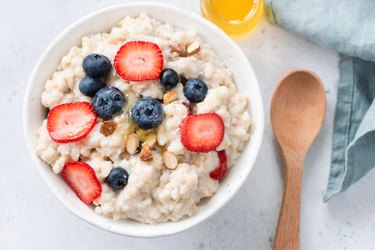
Oatmeal is a go-to breakfast food that's sure to get your day off to a nutritious start. But breakfast isn't the only time to eat oats. With their high fiber and low calorie counts, eating oats for lunch will help you stay on track with your diet while feeling satisfied throughout the afternoon.
Oats Benefit Weight Loss
Video of the Day
A hearty bowl of whole-grain oats is a more powerful weight loss tool than you might think, due to its low calorie count and proportionately high amounts of fiber and protein. Both fiber and protein play roles in weight loss because they increase feelings of fullness and satiety.
Video of the Day
One cup of cooked oats has close to 4 grams of fiber, according to USDA data. That's more than 10 percent of the recommended daily intake for men and 16 percent of the suggested amount for women, according to the Food and Nutrition Board of the National Academies of Sciences, Engineering, and Medicine. Adequate fiber intake is a primary predictor of weight loss in adults, according to a study published in the Journal of Nutrition in October 2019.
Oats are an especially good source of a type of fiber called beta-glucan, which may be particularly helpful for weight loss, reports Harvard T.H. Chan School of Public Health. Beta-glucan is a soluble fiber that attracts water in the gut and causes it to swell. It makes food more viscous, which increases the volume of food in the stomach and slows digestion, both of which lead to greater satiety and a lasting feeling of fullness.
Protein digests slowly, which means it has similar effects on satiety as fiber, keeping you feeling full for longer. There may be other mechanisms by which protein aids weight loss, according to a review in Nutrition and Metabolism in November 2014, including increasing hormones that signal satiety, suppressing the release of hunger hormones and increasing thermogenesis, or the amount of calories your body burns digesting food.
Finally, oats are low in calories, with only 143 per cooked cup. As long as you keep the other foods in your lunch healthy, you'll be able to cut calories without feeling deprived.
Eating Oats for Lunch
The best thing about oatmeal for lunch is how easy it is to take and eat on the go. As the name implies, overnight oats can be made the night before — with no cooking required. Simply combine oats with your lowfat dairy or nondairy milk of choice in a container, and leave to soak in the fridge for at least a few hours. The next morning, just grab and go. You can heat it up at work or eat it cold.
But plain oats are boring. Liven things up and add extra nutrition with any of these ingredients:
- 1/2 cup of raspberries, which are high in fiber and low in calories
- 1 ounce sliced almonds for extra protein
- 1/2 cup nonfat or lowfat Greek yogurt for extra protein
- 1 tablespoon chia seeds for fiber and healthy fats
- 1/2 of a mashed banana for sweetness without adding sugar
Don't feel like having traditional breakfast oats for lunch? No problem. There are plenty of other ways to incorporate oats into a nutrient-packed, low-calorie lunch. According to Harvard T.H. Chan School of Public Health, you can use oats to make a savory risotto by first toasting them in a little bit of oil, then slowly adding stock or water and stirring until the oats reach the right consistency. Add plenty of fresh vegetables for extra fiber.
You can also use rolled oats to make a veggie burger with almonds, brown rice, tofu and mushrooms, and you can use it as a base for a variety of savory bowls. Top the oats with eggs, feta cheese, olives and cilantro for a Turkish-inspired dish, or try a mouth-watering combination of sauteed kale, caramelized onions and goat cheese.
- USDA: "Oatmeal, Cooked, Regular, Fat Not Added in Cooking"
- Food and Nutrition Board of the National Academies of Sciences, Engineering, and Medicine: Dietary Reference Intakes (DRIs): "Recommended Dietary Allowances and Adequate Intakes, Total Water and Macronutrients"
- Journal of Nutrition: "Fiber Intake Predicts Weight Loss and Dietary Adherence in Adults Consuming Calorie-Restricted Diets: The POUNDS Lost (Preventing Overweight Using Novel Dietary Strategies) Study."
- Harvard T.H. Chan School of Public Health: "Oats"
- Nutrition and Metabolism: "A High-Protein Diet for Reducing Body Fat: Mechanisms and Possible Caveats"
- Harvard T.H. Chan School of Public Health: "Mushroom Tofu Veggie Burger"